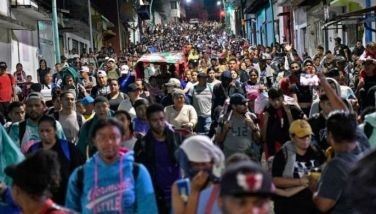France considers recognition of a Palestinian state
PARIS — France will recognize a Palestinian state if its efforts to revive Israeli-Palestinian peace talks at an international conference fail, Foreign Minister Laurent Fabius said Friday.
He told French diplomats that the conference will aim to bring together the two parties and their American, European and Arab partners in order "to make happen a two-state solution."
If this attempt faces a deadlock, Fabuis said, France will have to recognize a Palestinian state.
France's Socialist government supports the idea of two states, but had previously argued that it was too early for outright recognition of a Palestinian state.
Fabius' announcement comes as the Palestinians, buoyed by the successful Iran nuclear talks and the start of U.N.-mediated talks on Syria, have been exploring steps that could lead to a two-state solution including an international conference and a Security Council resolution that would demand an end to illegal Israeli settlement building.
Riyad Mansour, the Palestinian U.N. ambassador, told AP: "The Palestinian leadership do welcome the announcement of foreign minister Fabius today in Paris in connection with the convening of an international conference in the next few weeks, and if things fail the recognition of the state of Palestine by France."
"I think the objective of this conference ... has to be to open the process that would lead to the end of the occupation and the preservation of the two-state solution," he said.
As for recognition, Mansour said, "France promised us some time ago that if there is no opening for a meaningful political process — a collective process that would lead to the end of occupation and independence of the state of Palestine and therefore saving the two-state solution soon — then they will recognize the state of Palestine."
He said the Palestinians wanted recognition from France "some time ago," noting that the French parliament has unanimously recommended recognizing the state of Palestine.
"And we hope that they do that," Mansour said. "If they are tying it to the political process, that is their thinking. But eventually if you believe in a two-state solution, then recognizing the state of Palestine is an investment."
Israel's U.N. Mission did not immediately respond to a request for comment.
Earlier on Friday, at U.N. headquarters in New York, Mansour said the nuclear talks on Iran and talks on Syria, Yemen and Libya have spurred the Palestinians to seek a broader international framework to try to settle the decades-old conflict with Israel. "This is a new culture — and why shouldn't that spread to the Palestinian issue?," he asked.
Mansour said the Palestinians don't accept that in 2016 "the door is closed" and nothing can be done to make progress toward a two-state solution because of the U.S. presidential election in November.
He said that's why he has been engaging all 15 members of the Security Council, including Israel's close ally the United States, as well as the U.N. Secretariat and other "friends," on their readiness to take steps — especially since virtually all members at the last Mideast meeting spoke out against Israeli settlement building.
Mansour commended Secretary-General Ban Ki-moon "for characterizing correctly the settlements as illegal, illegitimate and a major obstacle to peace." Israel's Prime Minister Benjamin Netanyahu said Ban's remarks justify terrorism.
Besides a new resolution on settlements and an international conference, Mansour said he has raised the French idea of "a support group" of other countries to promote progress toward peace, an expansion of the Quartet of Mideast mediators — the U.S., U.N., European Union and Russia.
He said adoption of a Security Council resolution would be "a signal" that the council and key world powers want to end the conflict and see an independent Palestinian state.
- Latest
- Trending

































